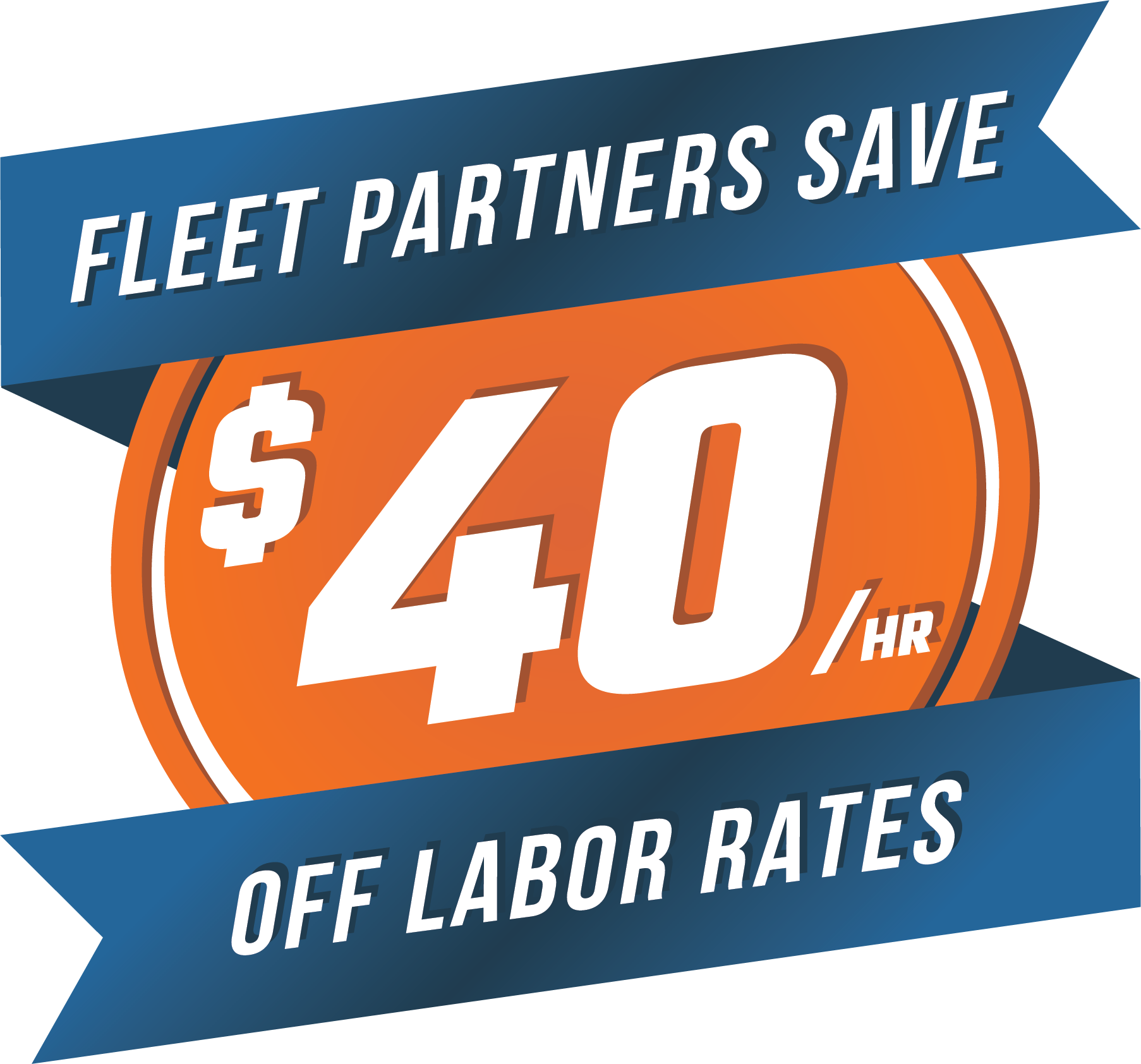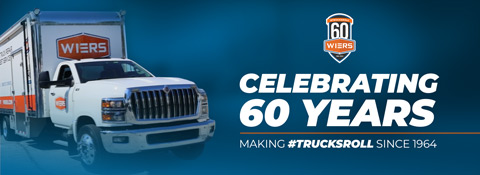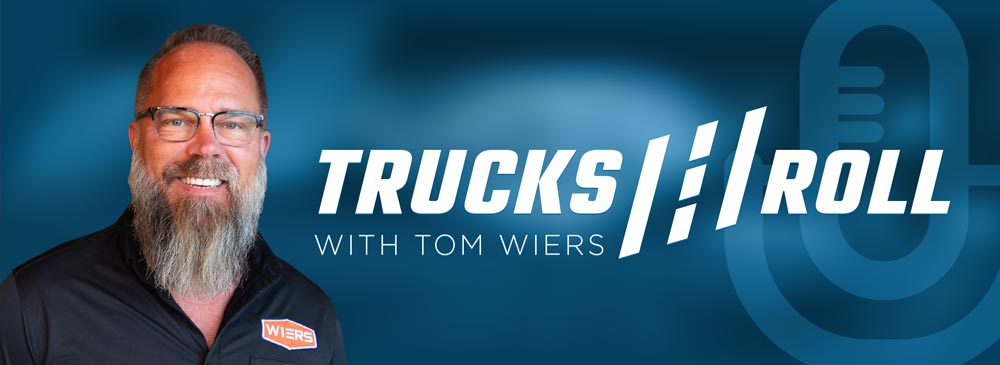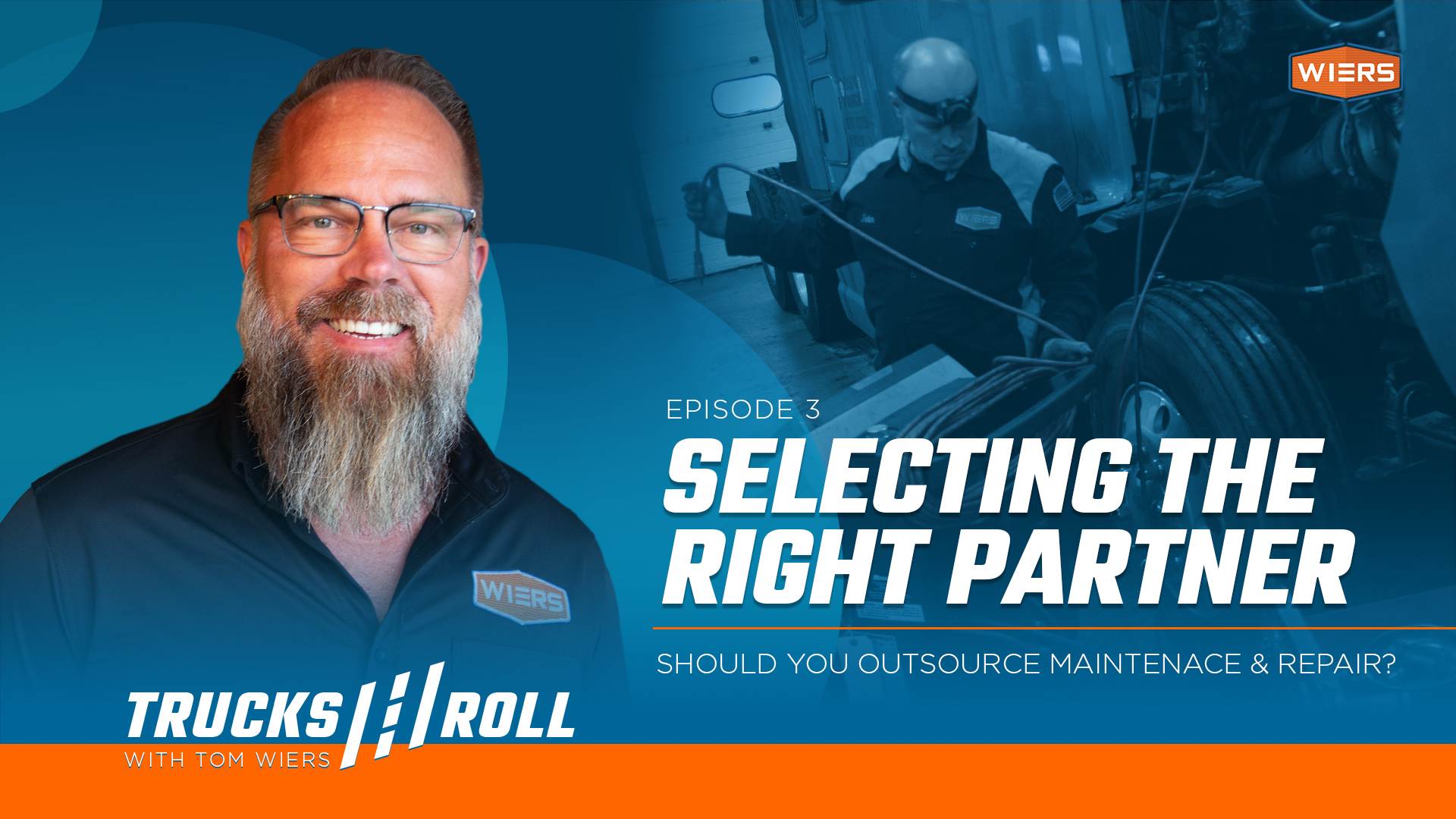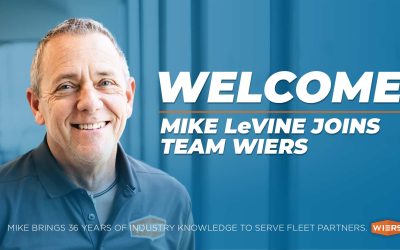
Maintaining & Selecting the Right Service Partner – Trucks Roll Podcast Ep. 3
Maintaining & Selecting the Right Service Partner
Tom and Liz drop in to discuss the factors you should use to evaluate who you choose to care for your trucks. Whether you’re a self-maintainer with a small staff of your own or on the search for a partner to help keep your trucks rolling, this episode will give you a great checklist of considerations for choosing your truck maintenance style!
Wiers is committed to providing the best service to our clients! If you’ve got maintenance needs and are looking for help, get in touch today!
We at Wiers are experts in this field and can help you keep your vehicles on the road and earning. Visit us at wiers.com today to learn more about our services and fleet partnership plans today!
What You’ll Learn:
- What options are available for fleet maintenance.
- Pros and cons of fleet partnership options.
- What to consider when making the choice of your service partner!
Here is the transcript for Trucks Roll Ep. 3:
Tom Wiers: And a lot of times in those situations, the owners aren’t really aware. I mean, they’re running their business, they’re making a profit. But we’ve certainly seen situations where trucks are poorly maintained, mistakes are made. They have to take them to the dealer or some other location to get them fixed, and those costs are getting buried and not really visible to management. So there’s a lot of hidden costs in those smaller operations. But certainly, the larger you get and the more fleet, the more sophisticated you get, the more investment you can make, the better the outcomes. Hello, everyone. I’m Tom Wiers, and welcome to the Trucks Roll podcast. This is episode number three, and with me today is Liz Wimmer. Hello, Liz.
Liz Wimmer: Hi, Tom. Hi, everybody. What are we going to talk through today?
Tom Wiers: Well, today we’re going to talk about the various ways of maintaining commercial trucks and vendor selection. So it’s a topic near and dear to my heart.
Liz Wimmer: Well, it sounds very exciting, but I have bad news. I have decided to leave Wiers via this podcast topic and I am now in charge of helping maintain 10 trucks at a new company. So now that we’re talking about this, this will be really helpful as I start my new role.
Tom Wiers: Well, Liz, I’m sorry to see you go after just less than a year, but in typical millennial fashion, I’m not surprised. No, I shouldn’t say that. That’s not very nice, is it, Liz?
Liz Wimmer: I am a millennial.
Tom Wiers: Jeez, yep.
Liz Wimmer: Thank you.
Tom Wiers: But in all seriousness, these are topics that we talk about our customers with and that is, “Hey, I’ve got a fleet and we’re maintaining them ourselves. Should we be doing that? And does that still make sense?” So it’s a great topic and it’s a worthwhile discussion. So I think we can jump into that a little bit here today. In Liz’s situation, she has 10 trucks. And while that’s a good amount of trucks, we like to think of maybe 30 trucks per technician is a good rule of thumb, perhaps 40. That can vary based on the age and the application of the equipment.
But the point of the initial response with Liz’s situation is that 10 trucks isn’t probably enough to keep one technician busy. So he probably has a lot of idle time on his hands. That might be okay. He’s perhaps being used just for general maintenance in the facility or others, or perhaps he’s just taking too long on his jobs. But when you have a small shop like that, one or two technicians, there are a lot of challenges. Number one, who’s supervising those individuals? Because you don’t really want to pay a supervisor to supervise one person. So they’re generally not well managed or supervised. And then turnover’s an issue. If you have one, and the technician leaves and goes somewhere else, then you’ve got a void, and that can take, jeez, 30, 60, 90 days to fill. So that leaves you in a spot, if you will.
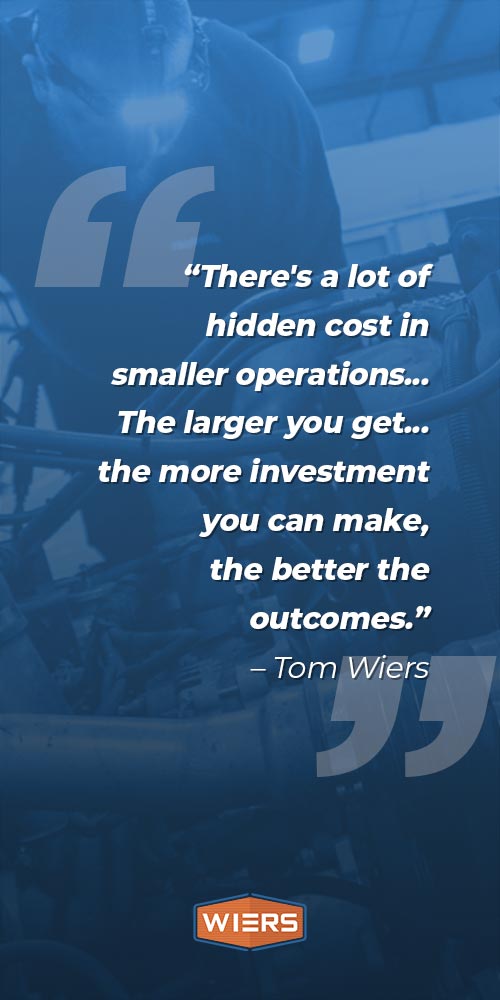
Liz Wimmer: Yeah. I feel like what you just shared is that based on what you know, that you would eliminate my role-
Tom Wiers: Well-
Liz Wimmer: … and my brand new job. So I’m coming back to Wiers. Can I come back?
Tom Wiers: Well, of course you can come back. Just got to get you set up on an account and make sure you pass the credit test. But, no, in all seriousness, if you outsource that, you might be able to do something more valuable to the organization like marketing or podcast or something and use your talents in a more effective way. But, yeah, certainly evaluating and other options or what our customers do pretty regularly.
Liz Wimmer: So how would you suggest someone in a role that really helps maintain larger numbers of trucks, how would you help them, or what would you suggest to evaluate some good practices in picking service partners?
Tom Wiers: Sure, yeah. Well, regardless of how many trucks you have, there are four ways of maintaining commercial trucks. I mean, there’s self-maintainers, the situation we just described. And that could be as little as one person or it can be a whole fleet of technicians and a whole maintenance staff, depending on the size of the organization. So self-maintaining, that’s one way. The other way is you can work with a dealer. So a OEM dealer, whether it’s an International dealer, Freightliner, or somebody in your area, and you can rely on the dealer for your repairs and maintenance. You can use an independent or a fleet service business. And of course, we check the box in the dealership business as well as the fleet service side with our various locations. Those are always really good options.
And then the fourth option is you can lease your trucks. And leasing, whether it’s an Idealease, or PacLease, or Penske, or Ryder, or something like that is a good option for many applications, but not all applications. And that’s probably a topic for another podcast, but really we think about it as self-maintainers, dealerships, fleet service/independents, they kind of use that ubiquitously, and then leasing options as well. So I can talk through, if you would like, some of the maybe pros and cons of each one of those.
Liz Wimmer: Yeah. Let’s do it.
Tom Wiers: Yeah. So, dealers are really well skilled. They’re generally well staffed. They have the training, the tooling, and they can pretty much do soup to nuts. So dealers are a really good option in most instances. They’re even a better option if you have a fleet of a particular brand. So let’s say in your situation, Liz, you have 10 trucks and they’re all International trucks. And so that makes it pretty accommodating to go to the International dealer, build a relationship with that location and have those trucks maintained there.
Now, let’s say you’re in a scenario where you have 10 trucks and you have five or six different manufacturers. You got a couple of Freightliners, a couple of Internationals, a Volvo, or Mack. Well, now all of a sudden using dealers becomes a little less convenient because instead of having 10 going to one dealer, you’ve got a couple going to a bunch of dealers. And so now you’re talking about managing different relationships and you’re not maybe as much of a priority with less trucks per dealer. So dealers can be great in certain applications, but some of the times they’re not a good fit. And I think that’s where on the fleet service side, independents can be really good, especially for those smaller mixed fleets where you have various sizes of chassis and various brands and such.
And the thing about the independents, generally, a little more accommodating, a little more personal, smaller operations. Oftentimes, the owners are intimately involved. They can be even your point of contact. But the challenge with independents is you’ve got to make sure that they’re current on technology, they’re current on training, they’ve got the right insurance in place, because when problems happen, you want somebody that’s going to be able to stand behind… That if you blow a motor and it was the vendor’s fault, and that’s a $30,000 repair, you don’t want to eat that bill yourself. Obviously, you’re looking to the vendor to take care of that. So you got to make sure you’re dealing with somebody that has the financial wherewithal to stand behind the business that you’re doing with them. So those are good solutions.
And then leasing, as we talked about, leasing can be really good, especially the more generic the application in the truck, the better, the more specialized, the longer… Oftentimes, on a specialized piece of equipment, the body is worth more than the chassis. And the specialized equipment doesn’t often run as many miles and such. So customers are looking to hold onto that equipment for 10, 15, 20 years, perhaps. That leasing model tends to break down in those applications, and it just is really not very cost-effective at all. So I think there’s a lot of things to look at when you’re evaluating.
And as I’ve said before, once you make a decision, a choice on who you’re going to work with, or I should say in an effort to make that decision, go out and visit them and see their operation. Walk through their shops, talk to their personnel, ask them to show you their technology, ask them to show you some training material and just understand how they do business. Don’t just try to do it from your office. Get out in the real world and see what’s going on. And then when you select a vendor, try to stick with them at least a year and build that relationship and see how it goes. And if it’s working, fantastic. If not, continue to invest in the relationship. We’ve found that’s probably the proof solution in our experiences.
Liz Wimmer: Well, this is very helpful information in my new role. And I think I’ve decided to come back as Wiers’ marketing manager. So thank you for the helpful information.
Tom Wiers: Great. Well, thanks, Liz, appreciate the opportunity to share that vendor selection ideas and different ways to maintain commercial trucks. Would love for everyone to go to wiers.com, check out some of the materials we have on our website. And if you have questions about how we can help you with your vendor selection, whether we’re part of it or not, we’re always here to help those individuals in the commercial truck space any way we can. So, Liz, appreciate your time today and look forward to our next podcast coming up soon. Thanks, everyone. Have a great day.
Listen To “Trucks Roll” Podcast
Links:
- Share your thoughts and connect with us on Facebook
- Check out more videos on Youtube
- Listen to the Previous Episode
